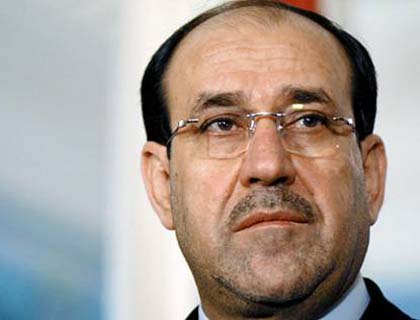BAGHDAD - Iraq will continue talks with Washington on how U.S. trainers can work with Iraqi forces after a complete withdrawal of American troops at the end of the year, Prime Minister Nuri al-Maliki said on Saturday. U.S. President Barack Obama announced on Friday that all U.S. troops would leave Iraq as scheduled by the end of this year after the two governments failed to reach an agreement over giving American soldiers legal immunity.
"Now that we have put this behind us, this will let us settle the issue of training," Maliki said. "Iraqis will ask to resume talks over the number of trainers, the duration (of their stay in Iraq) and how those trainers will be used."
More than eight years after the invasion to topple Saddam Hussein, violence has fallen since the sectarian slaughter of 2006-2007. But Iraq still faces a stubborn Sunni Islamist insurgency tied to al Qaeda and rival Shi'ite militias.
U.S. and Iraqi officials say the local armed forces can contain violence but they need trainers to help build up air defense, maritime capabilities, intelligence gathering and moving the military to conventional warfare tactics.
Iraq will get some military training from a U.S. embassy program and from contractors who are part of a package with the U.S.-made military hardware Baghdad is purchasing, such as F-16 fighter jets and tanks.
Military advisers working at the embassy are covered by diplomatic immunity afforded to the State Department.
U.S. Secretary of State Hillary Clinton said on Saturday that U.S. commitment to the democratic future of Iraq remains strong despite the decision to go ahead with the withdrawal of American troops as scheduled.
"Even as our troops come home, the United States's commitment to Iraq's future as a secure, stable, democratic nation remains as strong as ever," she said at a news conference in the Tajik capital. "This will end the war and it will open a new chapter in our relationship."
Clinton said Washington expected to have a "significant" security training presence at the Baghdad embassy.
Washington had hoped a few thousand troops in Iraq would help buttress its stability and offset the influence of neighboring Iran. U.S. officials initially had sought Baghdad's approval for around 3,400 troops.
Many Iraqis are worried about their country's stability and security without the buffer of U.S. military presence, and fear Iraq may slip back into the sectarian tensions that pushed the country to the brink of civil conflict. (Reuters)

